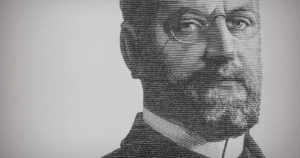
The Credo Fellow Bookclub with Scott Swain
Credo Fellow Sco tt Swain (Ph.D., Trinity Evangelical Divinity School) is President and James Woodrow Hassell Professor of Systematic Theology at Reformed Theological Seminary in Orlando, Florida. Dr. Swain has served on the RTS faculty since 2006, having previously taught at Southwestern Baptist Theological Seminary in Fort Worth, Texas. He serves as co-general editor of two series: Zondervan Academic’s New Studies in Dogmatics and T & T Clark’s International Theological Commentary. Dr. Swain is an ordained minister in the Presbyterian Church in America. He and his wife, Leigh, have four children. Dr. Swain blogs regularly at Reformed Blogmatics.
tt Swain (Ph.D., Trinity Evangelical Divinity School) is President and James Woodrow Hassell Professor of Systematic Theology at Reformed Theological Seminary in Orlando, Florida. Dr. Swain has served on the RTS faculty since 2006, having previously taught at Southwestern Baptist Theological Seminary in Fort Worth, Texas. He serves as co-general editor of two series: Zondervan Academic’s New Studies in Dogmatics and T & T Clark’s International Theological Commentary. Dr. Swain is an ordained minister in the Presbyterian Church in America. He and his wife, Leigh, have four children. Dr. Swain blogs regularly at Reformed Blogmatics.
To learn more about Dr. Swain’s research, check out some of his books below!
T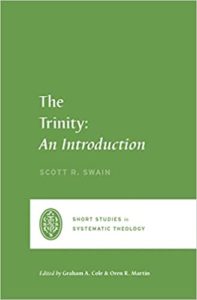 he Trinity: An Introduction (Crossway, 2020)
he Trinity: An Introduction (Crossway, 2020)
The Trinity is one of the most essential doctrines of the Christian faith.
The eternal God existing as three distinct persons―Father, Son, and Spirit―can be difficult to comprehend. While Christians often struggle to find the right words to describe this union, the Bible gives clarity concerning the triune God’s being and activity in nature (creation), grace (redemption), and glory (reward). In this concise volume, theologian Scott Swain examines the doctrine of the Trinity, presenting its biblical foundations, systematic-theological structure, and practical relevance for the church today.
R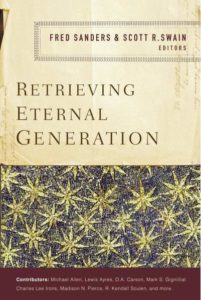 etrieving Eternal Generation (Zondervan, 2017)
etrieving Eternal Generation (Zondervan, 2017)
Although the doctrine of eternal generation has been affirmed by theologians of nearly every ecclesiastical tradition since the fourth century, it has fallen on hard times among evangelical theologians since the nineteenth century. The doctrine has been a structural element in two larger doctrinal complexes: Christology and the Trinity. The neglect of the doctrine of eternal generation represents a great loss for constructive evangelical Trinitarian theology.
Retrieving the doctrine of eternal generation for contemporary evangelical theology calls for a multifaceted approach. Retrieving Eternal Generation addresses (1) the hermeneutical logic and biblical bases of the doctrine of eternal generation; (2) key historical figures and moments in the development of the doctrine of eternal generation; and (3) the broad dogmatic significance of the doctrine of eternal generation for theology. The book addresses both the common modern objections to the doctrine of eternal generation and presents the productive import of the doctrine for twenty-first century evangelical theology. Contributors include Michael Allen, Lewis Ayres, D. A. Carson, Oliver Crisp, and more.
T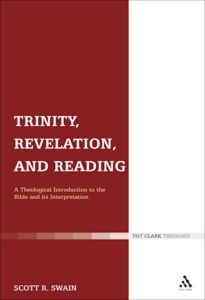 rinity, Revelation, and Reading: A Theological Introduction to the Bible and Its Interpretation (T&T Clark, 2011)
rinity, Revelation, and Reading: A Theological Introduction to the Bible and Its Interpretation (T&T Clark, 2011)
A theology of biblical interpretation, treating both topics in light of their relationship to the triune God and the economy of redemption. This book includes chapters on:
2. The Role of Holy Scripture in Kingdom and Covenant
3. The Inspiration and Perfection of Holy Scripture
4. Reading as an Act of Covenant Mutuality, Part One: Regeneration, Renewal, and the Role of the Church
5. Reading as an Act of Covenant Mutuality, Part Two: The Practice of Reading and the Shape of Interpretation
R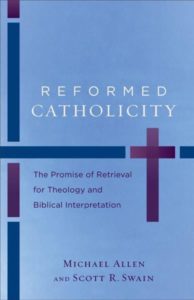 eformed Catholicity: The Promise of Retrieval for Theology and Biblical Interpretation (Baker, 2015)
eformed Catholicity: The Promise of Retrieval for Theology and Biblical Interpretation (Baker, 2015)
Can Christians and churches be both catholic and Reformed? In this volume, two accomplished young theologians argue that to be Reformed means to go deeper into true catholicity rather than away from it. Their manifesto for a catholic and Reformed approach to dogmatics seeks theological renewal through retrieval of the rich resources of the historic Christian tradition. The book provides a survey of recent approaches toward theological retrieval and offers a renewed exploration of the doctrine of sola scriptura. It includes a substantive afterword by J. Todd Billings.
T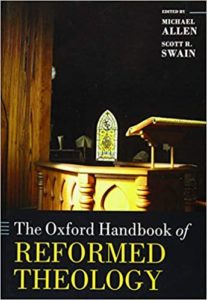 he Oxford Handbook of Reformed Theology (Oxford, 2020).
he Oxford Handbook of Reformed Theology (Oxford, 2020).
The Oxford Handbook of Reformed Theology looks back to past resources that have informed Reformed theology and surveys present conversations among those engaged in Reformed theology today. First, the volume offers accounts of the major historical contexts of reformed theology, the various relationships (ancient and modern) which it maintains and from which it derives. Recent research has shown the intricate ties between the patristic and medieval heritage of the church and the work of the reformed movement in the sixteenth century. The past century has also witnessed an explosion of
reformed theology outside the Western world, prompting a need for attention not only to these global voices but also to the unique (and contingent) history of reformed theology in the West (hence reflecting on its relationship to intellectual developments like scholastic method or the critical approaches of modern biblical studies). Second, the volume assesses some of the classic, representative texts of the reformed tradition, observing also their reception history. The reformed movement is not dominated by a single figure, but it does contain a host of paradigmatic texts that demonstrate the range and vitality of reformed thought on politics, piety, biblical commentary, dogmatic reflection, and social engagement. Third, the volume turns to key doctrines and topics that continue to receive attention by reformed theologians today. Contributors who are themselves making cutting-edge contributions to constructive theology today reflect on the state of the question and offer their own proposals regarding a host of doctrinal topics and themes.
T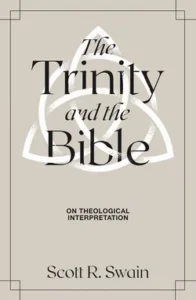 he Trinity and the Bible: On Theological Interpretation (Lexham, 2021)
he Trinity and the Bible: On Theological Interpretation (Lexham, 2021)
Orthodox Christians affirm and worship a triune God. But how should this affect our reading of the Bible? In The Trinity and the Bible, Scott R. Swain asserts that not only does the Bible reveal the Trinity, but the Trinity illuminates our reading of the Bible.
Swain reflects on method and applies a Trinitarian framework to three exegetical studies. Explorations of three genres of New Testament literature—Gospel, epistle, and apocalyptic—display the profits of theological interpretation.
Through loving attention to the Scriptures, one can understand and marvel at the singular identity and activity of the triune God.
